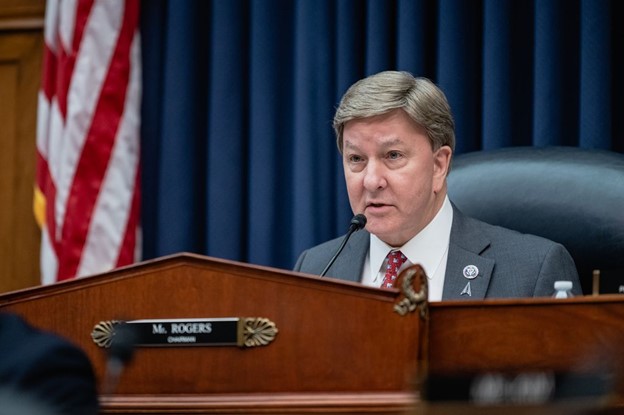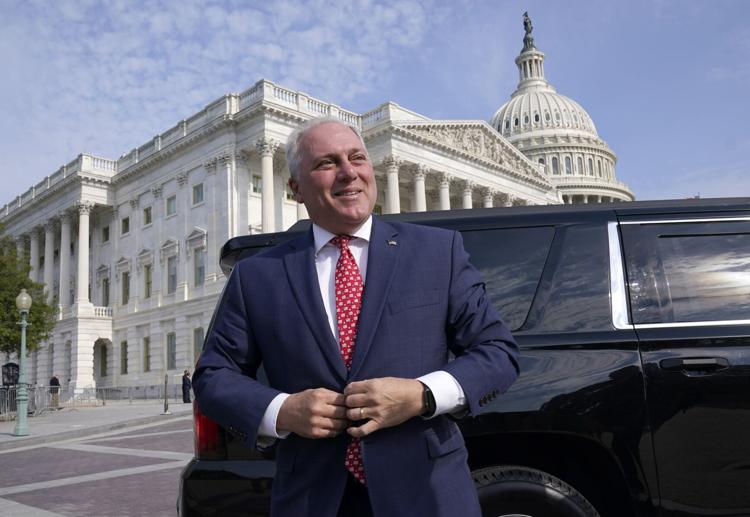Mike Johnson elected speaker of the House after three weeks of infighting

By Casey Harper | The Center Square The U.S. House of Representatives voted Wednesday to elect Rep. Mike Johnson, R-La., as speaker of the House, ending more than three weeks without a speaker and a string of chaotic meetings and votes on Capitol Hill. Johnson received multiple standing ovations from his colleagues Wednesday before securing the speakership. The final vote was 220-209, with Democrats supporting Minority Leader Hakeem Jeffries. “Today is the day that House Republicans will humbly look in our hearts and elect Mike Johnson as speaker of the people’s House,” Conference Chair Rep. Elise Stefanik, R-N.Y., said in a speech from the House floor ahead of the vote, calling Johnson “a man of deep faith,” and “a deeply respected Constitutional lawyer.” “Mike is strong, tough, and fair, and above all, Mike is kind,” Stefanik added. Stefanik announced on Sunday nine candidates that were making a bid to be speaker, but that number was slowly whittled down as lawmakers dropped out. “Today is the day we get this done,” Stefanik said in her Wednesday speech. U.S. Rep. Pete Aguilar, D-Calif., gave a speech from the floor to nominate Jeffries for speaker and attack Republicans. Jeffries blasted Republicans for “all of the infighting, all of the disarray just to end up where we were three weeks ago.” Johnson pitched Republicans on an aggressive legislative agenda over the next few weeks. Under his leadership, the House will face a looming partial government shutdown deadline in the middle of November as well as ongoing calls to fund Ukraine and Israel in their respective wars. “We must govern well and expand our majority next year,” Johnson said in a letter to his fellow Republicans over the weekend, asking for support in the speakership race. President Joe Biden called on Congress last week for more than $100 billion to that end, as well as funding for Taiwan, the immigration issue, and other priorities. That proposal was met with immediate pushback from Republicans in the House and Senate. Some funding for Israel, though, is likely to pass. More funding for Ukraine has become a divisive issue for Republicans, and it remains unclear how many more billions lawmakers will be willing to send to Ukraine. Notably, U.S. Rep. Kevin Hern, chairman of the Republican Study Committee, was running for speaker but later dropped out and told reporters he was supporting Johnson. The chaotic three-week battle for a speaker began when U.S. Rep. Matt Gaetz, R-Fla., filed a motion to vacate former House Speaker Kevin McCarthy, R-Calif. At that point, Majority Leader Steve Scalise won the nomination but quickly backed out after being unable to secure the needed votes. After that, House Judiciary Chair Rep. Jim Jordan, R-Ohio, won the nomination but lost it days later after three failed votes on the House floor, with 25 Republicans ultimately voting against him. Majority Whip Tom Emmer, R-Minn., was next to secure the nomination but almost immediately withdrew after failing to gain support. Notably, former President Donald Trump campaigned against Emmer. Before the vote Wednesday, Johnson posted on X, formerly known as Twitter, a picture of the American flag in the House Chamber, which has inscribed above it, “In God We Trust.” Republished with the permission of The Center Square.
Palmer withdraws from Speaker’s race: lists five commitments for the next Speaker of the House

On Tuesday, Congressman Gary Palmer (R-AL06) released a statement announcing that he has withdrawn his name from consideration for Speaker of the House. “Congress and the American people needed a Republican Speaker three weeks ago,” Palmer said in a statement. “If withdrawing my name can help expedite that process even a little, then I will gladly step aside. The candidate forum and individual conversations have given me great hope for the future of the 118th Congress. All the candidates are committed to ideas similar to the principles I laid out last night. We must bring stability back to the House of Representatives, and we do that by passing our spending bills on time, providing real spending cuts, not passing short-term CRs, allowing members time to read legislation, and uniting the conference before going to the House floor. These principles will truly transform how this place works and ensure it works for the benefit of the American people.” “I will work with the next speaker on the ideas I have laid out so Congress can come together and do the job the American people sent us here to do. With this in mind, I am withdrawing my name from consideration for Speaker.” Earlier on Tuesday, Palmer released a list of five commitments he is asking the next speaker to make. Palmer released the policy outline less than an hour before the House Republican Conference went into a closed-door session to vote on who would be the next nominee for Speaker of the House. Palmer was one of nine Republicans to declare their candidacy for the vacant position. The five commitments include a commitment to fund the government with 12 individual spending bills by June 30; forcing “real spending cuts” and not “budget gimmicks;” refusing to pass any more short-term stopgap funding bills; giving members 72 hours to read a bill before it reaches the House floor for an up or down vote; and requiring sure that the GOP conference is on the same page before holding a House-wide vote. “Congress has been kicking the can down the road since before I was elected,” Palmer said. “We don’t need a person or a personality, we need a plan.” Palmer and the other eight candidates presented their cases to the House Republican Conference in a closed-door forum on Monday night. On Tuesday morning, the GOP Congressmembers will vote on their nominee. Once the GOP selects a nominee, a vote of the full House could come as soon as Tuesday afternoon. The difficulty has not been getting the nomination; the problem has been getting 217 Republican Congress members to vote for the Republican nominee. The last GOP nominee, House Judiciary Committee Chairman Jim Jordan (R-Ohio), never got more than 200 votes in his three House floor votes. A coalition of moderate and more mainstream Republicans opposed the ultra-conservative Jordan because they thought the former Freedom Caucus Chairman was too divisive. The previous nominee, House Majority Leader Steve Scalise (R-Louisiana), got the nomination but could not get the support of Jordan-supporting Freedom Caucus Republicans. On October 3, then Speaker of the House Kevin McCarthy (R-California) was ousted when eight Republicans who objected to aid for Ukraine led by Rep. Matt Gaetz (R-Florida) voted with Democrats to oust the Speaker. Palmer supported Jim Jordan on all three House floor votes. He also voted in favor of McCarthy. Whoever wins the Speaker’s nomination must somehow get all the squabbling Republican factions to unite. If a third GOP nominee fails, the GOP conference could repeat this process with new candidates next week. Palmer is a native of Hackleburg, where his father was a small farmer and logger. He has some American Indian heritage. He is a graduate of the University of Alabama. He and Tom Parker cofounded the Alabama Policy Institute – a conservative think tank outside Birmingham. Palmer headed the Alabama Policy Institute for 24 years until he ran for Congress. Palmer is serving in his fifth term representing Alabama’s Sixth Congressional District. To connect with the author of this story or to comment, email brandonmreporter@gmail.com
Republicans announce nine new speaker candidates

By Casey Harper | The Center Square Nine new Republican lawmakers have thrown their hat in the ring to become the next speaker of the U.S. House. Republican Conference Chair Rep. Elise Stefanik released the list of candidates, who had until noon Sunday to announce their candidacy. The list, which Stefanik posted on X, formerly known as Twitter, is as follows: The new list of candidates comes after former House Speaker Kevin McCarthy, R-Calif., was ousted from the role when Rep. Matt Gaetz, R-Fla., filed a motion to vacate. Then, Majority Leader Steve Scalise, R-La., was the party’s choice to become speaker, but he withdrew when he was unable to get the support he needed. House Judiciary Chair Rep. Jim Jordan, R-Ohio, was next in line and worked for several days to get the needed 217 votes to become speaker. However, at least 20 Republicans voted against him across his three floor-vote attempts, and on Friday, his nomination was revoked. Some of the candidates have more support than others. Donalds’ announcement drew more attention than some others. Emmer has been a rumored pick for speaker as well. However, conservative Republicans have expressed frustration with moderate Republicans for rejecting Jordan, who had significant support with the Republican base but was seen as a hardline conservative who questioned the results of the 2020 presidential election. “The most popular Republican in Congress was just knifed in an anonymous vote in a secret closed-door meeting in the basement of the Capitol,” Gaetz wrote on X Friday. “This is the Swamp at work.” Meanwhile, some more moderate Republicans have expressed frustration with Gaetz and do not want to reward his ousting of McCarthy with an aggressive conservative pick. As The Center Square previously reported, Jordan sparked pushback from his own party on Thursday after reports surfaced that he said behind closed doors he would back the speaker pro Tempore, U.S. Rep. Patrick McHenry, R-N.C., for a limited temporary speakership role so the government could be funded and other key legislative goals hit. The federal government faces a partial shutdown in November, and there is increasing pressure to send more funds for the Ukraine and Israel wars. President Joe Biden called on Congress to pass a spending package of $105 billion for those wars as well as some border funding and money for Taiwan, which national security experts say China could invade at any time. Jordan later addressed reporters, announcing he would drop that plan and instead hold another vote. That plan still has potential to take effect. While many Republicans have expressed opposition to the idea, Democrat Minority Leader Hakeem Jeffries has seemed open to the idea when talking with reporters. Republished with the permission of The Center Square.
After third failed vote, Jim Jordan will not be Speaker of the House

On Friday, the House of Representatives again rejected House Judiciary Chairman Jim Jordan (R-Ohio) in a third vote for the Speaker of the House. The third vote was his poorest performance yet as more and more GOP House members abandoned the conservative firebrand’s cause. Just hours after that vote, the Republican Conference met and, in a secret ballot, voted to no longer back Jordan as the GOP nominee for Speaker. Jordan was never the first choice of House Republicans. Most, including Jordan himself, voted not to oust Speaker of the House Kevin McCarthy (R-California). Rep. Matt Gaetz (R-Florida) and eight disgruntled far-right House members voted with House Democrats to oust McCarthy. The Conference chose House Majority Leader Steve Scalise (R-Louisiana) over Jordan in a close conference vote. Scalise failed to get the commitment from conservatives for a viable run for Speaker. Seeing that he did not have the 217 votes needed to be elected Speaker, Scalise withdrew. Jordan defeated Rep. Austin Scott (R-Georgia) on Friday, August 13. All six Republican Alabama House congressional delegation members supported Jordan’s failed bid for the Speaker’s gavel. Former Speaker McCarthy endorsed Jordan and gave a floor speech Friday morning encouraging members to back him, but this failed to sway the growing anti-Jordan faction within the House Republican Caucus. Jordan, the founding Chairman of the ultra-conservative Freedom Caucus, struggled to convince mainstream and moderate House members to support him. On the first vote, he received just 200 votes – 17 shy of being elected Speaker. That was the closest that he would ever come. On Thursday, Jordan announced that he had suspended his campaign for Speaker and instead would back giving the Speaker Pro Tem Patrick McHenry (R-North Carolina) emergency powers so that the House could function until January. Opposition prevented that plan from being adopted, so Jordan resumed his campaign for Speaker late Thursday evening, leading to that doomed third vote on Friday morning. With Jordan no longer the nominee and the GOP Conference extremely divided, the House is in something close to chaos. On Thursday, President Joe Biden asked Congress to provide $10 billion to Israel for its war with Hamas and other terror organizations and $50 billion more in emergency aid for Ukraine in its war with Russia. Moving on the aid request or passing budgets to avoid a government shutdown on November 15 is all at a standstill until House Republicans can decide on a Speaker of the House. At this point, it appears that the next Republican nominee will not be Rep. Jordan. To connect with the author of this story or to comment, email brandonmreporter@gmail.com.
House rejects Jim Jordan for a second time

On Wednesday, the U.S. House of Representatives voted for a second time to reject the Republican Party nominee, House Judiciary Committee Jim Jordan (R-Ohio), for Speaker of the House. Jordan again failed to get the 217 votes necessary to be elected. Jordan Both was still well short of the 217 needed to get the position and actually did worse on the second ballot than he did on the first. Jordan has vowed to run on a third ballot on Thursday. The House Republican Caucus has been bitterly split since Rep. Matt Gaetz (R-Florida) led a group of eight disgruntled Republicans that voted with Democrats to remove Rep. Kevin McCarthy (R-California). House Majority Leader Steve Scalise (R-Louisiana) defeated Jordan to become the conference’s first choice, but he withdrew last week when conservatives refused to support him in the House floor vote. It is now GOP centrists and moderates that are opposing Jordan after the far right of the Caucus toppled McCarthy and blocked Scalice. Jordan was the Founding Chairman of the ultraconservative House Freedom Caucus. Jordan defeated Austin Scott (R-Georgia) for the GOP nomination in a meeting of the GOP conference Friday after Scalise’s withdrawal. Some members have talked about voting to give the interim Speaker more powers so that the House can continue to function, while the GOP Congress members continue their leadership struggle. Meanwhile, the federal government is racing towards a partial shutdown if Congress does not pass a budget or at least another continuing resolution (C.R.) by November 14. On both of the House floor votes, Jordan had the support of all six Republican congressmen from Alabama. However, Rep. Mike Rogers (R-AL03) was an outspoken opponent of Jordan becoming the Republican nominee. If Jordan cannot sway 217 GOP congress members to support his candidacy, the Caucus may need to look for a less divisive, more likable candidate to be their nominee. Who that would be, however, at this point, is entirely up in that air. To connect with the author of this story or to comment, email brandonmreporter@gmail.com
Mike Rogers flips support to Jim Jordan

Fox News is reporting that Congressman Mike Rogers (R-ALL03) has flipped from being the most outspoken “Never Jordan” member of the House of Representatives to being a supporter. Rogers’ flip makes it much more likely that Congressman Jim Jordan (R-Ohio) can win over enough moderate Republicans that he can be the next Speaker of the House. After Jordan won the Republican nomination for Speaker of the House, Rogers vowed to reporters that he would “never support” Jordan. There were even reports of Rogers negotiating with Democrats to form some sort of unity government to prevent Jordan from being elected as Speaker. That changed on Monday when Rogers went to the social media site X to announce he would support Jordan’s speakership bid. “@Jim Jordan and I have had two cordial, thoughtful, and productive conversations over the past two days,” Rogers said on X Monday. “We agreed on the need for Congress to pass a strong NDAA, appropriations to fund our government’s vital functions, and other important legislation like the Farm Bill.” “As a result, I have decided to support Jim Jordan for Speaker of the House on the floor,” Rogers followed up. “Since I was first elected to the House, I have always been a team player and supported what the majority of the Republican Conference agrees to,” Rogers added. “Together, our Republican majority will be stronger to fight Joe Biden’s reckless agenda for America.” Jordan thanked Rogers for his support. Jordan stated, “Your leadership is just what our Conference needs right now. We must all keep coming together and get back to work.” Just last week, Rogers had said that “there was nothing that Jordan could do to get his support as Speaker of the House.” Rogers is the Chairman of the House Armed Services Committee. Jordan is the Chairman of the House Judiciary Committee. A key point of disagreement between Republicans is whether or not to continue supporting massive amounts of military aid for Ukraine. Rep. Matt Gaetz (R-Florida) and a group of eight disgruntled Houe members used the Ukraine issue as a pretext for voting with Democrats to oust Speaker of the House Kevin McCarthy (R-California). Jordan secured the Republican party’s speaker nomination on Friday, defeating Georgia Congressman Austin Scott. Jordan had lost to House Majority Leader Steve Scalise (R-Louisiana) in a prior vote, but Scalise was unable to win over conservatives. Jordan Defeated Scott by a vote of 124 to 81. Jordan has been negotiating with GOP moderates like Jordan over the weekend in order to get to the 217 votes needed to secure the position of Speaker in a floor vote that could come as early as Tuesday. Congressmen Barry Moore, Gary Palmer, and Jerry Carl have all already publicly announced their support for Jordan. If Jordan cannot get the 217 votes necessary to win the Speakership, the Republican conference would likely have to nominate someone else. To connect with the author of this story or to comment, email brandonmreporter@gmail.com.
Jim Jordan receives House Republican nomination to be Speaker of the House

On Friday, the House Republican Caucus nominated House Judiciary Committee Chairman Jim Jordan (R-Ohio) to be the next Speaker of the House. This was only hours after House Majority Leader Steve Scalise (R-Louisiana) told his fellow Republicans that he was withdrawing his nomination after failing to secure the 217 votes needed for election. Jordan received 124 votes on Friday – a marked improvement over the 100 votes he received when he finished second to Scalise earlier this week. Congressman Austin Scott (R-Georgia) was the second-place finisher. This fight has bitterly divided the caucus and even the Alabama congressional delegation. Jim Jordan is supported by both Congressmen Barry Moore (R-AL02) and Gary Palmer (R-AL06). On Friday, Congressman Mike Rogers (R-AL03) told reporters that there is nothing that Jordan can say to make him change his mind on opposing Jordan. Rogers Chairs the powerful House Armed Services Committee. This drama became necessary after eight disgruntled GOP Caucus members led by Rep. Matt Gaetz (R-Florida) joined with Democrats to oust former Speaker Kevin McCarthy (R-California). To connect with the author of this story or to comment, email brandonmreporter@gmail.com.
Jim Jordan next to try shot for speaker of the House

By Casey Harper | The Center Square House Republicans have nominated Judiciary Chair Jim Jordan, R-Ohio, to be speaker of the House, but it remains unclear if Jordan can get the needed 217 votes from his own fractured party. Rep. Austin Scott, R-Ga., a lesser-known member, threw his name in the hat for the position as well and got significant support in the nomination vote, though possibly only as a vote against Jordan instead of a true vote for Scott. Later, though, Scott threw his support behind Jordan. “I highly respect Jim Jordan. He is an asset to the Republican Party and our nominee for Speaker,” Scott wrote on X, formerly known as Twitter. “Our conference has spoken, and now we must unite behind Jordan so we can get Congress back to work.” Jordan has conservative chops and support from the party base, but many moderates may not be willing to go his way. “For years, I’ve stayed out of House leadership elections, but this time I endorsed [Jordan],” Sen. Ted Cruz, R-Texas, wrote on X. “Jim is a good friend and a strong conservative. My philosophy on political endorsements is to support the strongest conservative who can win. That is Jim Jordan.” U.S. House Republican Majority Leader Steve Scalise, R-La., was the leading contender to be the speaker of the House Thursday morning, but he later withdrew his bid before taking it to a public vote after he failed to get enough support. Meanwhile, lawmakers in the House face a partial government shutdown in mid-November along with growing pressure to supply funds, ammunition, and weapons to both Ukraine and Israel, which has declared war on the terrorist group Hamas. Until lawmakers land on a speaker, legislation cannot move forward. As The Center Square previously reported, another key issue for lawmakers to handle is whether one lawmaker will still be able to file a motion to vacate the speaker, an unusual allowance given by McCarthy to secure the needed votes after the series of speakership votes earlier this year. Rep. Matt Gaetz, R-Fla., used that very allowance to file the motion that led to the ousting of former House Speaker Kevin McCarthy, R-Calif. The current Speaker Pro Tempore is Rep. Patrick McHenry, R-N.C., who will determine the times of any speaker votes until a lawmaker wins the speakership. “The DC Uniparty does not want a Speaker who would threaten their status quo,” Rep. Andy Biggs, R-Ariz., wrote on X. “We need a strong conservative for Speaker of the House!” Republished with the permission of The Center Square.
Steve Scalise drops out of Speaker’s race; GOP is back to square one

Late on Thursday, House Majority Leader Steve Scalise (R-Louisiana) announced that he had dropped out of the Speaker of the House race just one day after he narrowly was chosen as the Republican nominee for the position over House Judiciary Committee Chairman Jim Jordan (R-Ohio). Scalise’s early withdrawal from the race leaves the GOP without a candidate. While Scalise beat Jordan in the anonymous closed-door GOP caucus vote, it was obvious to almost everyone that it would be next to impossible for him to get the 217 votes needed to win the Speakership on the House floor. A number of Republican congress members declared on Thursday that they would not vote for him. “It’s been quite a journey,” Scalise said after leaving a conference with GOP congressmembers. “And there’s still a long way to go. I just shared with my colleagues that I’m withdrawing my name as a candidate for the speaker designee.” While the earlier caucus vote was not public, Congressmen Barry Moore (R-AL02) and Gary Palmer (R-AL06) had publicly endorsed Jordan. Jordan also had the endorsement of former President Donald Trump. It is not clear as of press time whether Jordan is still a viable candidate for this or not. Before the Caucus vote, former Speaker of the House Kevin McCarthy (R-California) had said earlier in the week that he would be willing to serve if GOP members decide they want him back. McCarthy was forced out last week in a motion to oust the Speaker when eight Republicans led by Matt Gaetz (R-Florida) voted with House Democrats on a vote to oust Jordan. Adding to the drama is the fact that all of the 12 spending bills have not yet passed the House. The government is operating on a 45-day continuing resolution (CR) negotiated by McCarthy to keep the government funded. The new Speaker, whoever that is, will immediately have to swiftly negotiate a spending deal that can pass the Democrat-controlled Senate and then be signed by President Joe Biden without fracturing the GOP Caucus in the House. Moore was supposed to address the Montgomery Republican Party but could not attend due to the political crisis. To connect with the author of this story or to comment, email brandonmreporter@gmail.com.
Steve Scalise faces significant opposition in speakership bid

By Casey Harper | The Center Square U.S. House Republican Majority Leader Steve Scalise, R-La., was the leading contender to be the Speaker of the House Thursday morning, but mounting opposition is threatening his chance. House Judiciary Chairman Jim Jordan, R-Ohio, is a key contender as well, but at least for now, neither seems able to nab the 217 needed votes to become speaker of the House. Meanwhile, Democrats have nominated Democrat Minority Leader Hakeem Jeffries, D-N.Y., to be speaker. While Republicans will likely be unwilling to support that choice, they may have to work with Democrats to find a lawmaker palatable enough to both sides. Until the House selects a speaker, no legislation can go forward. After Scalise’s nomination, there were hopes of an immediate vote but is still working to rally the 217 votes needed to become House Speaker. Republicans met again Thursday, but a vote has yet to take place. The pushback comes after Scalise received the support of a majority of his fellow House Republicans for the speaker of the House nomination during a closed-door conference meeting Wednesday. That vote was conducted by secret ballot, with Scalise narrowly besting Jordan on a vote of 113-99, according to multiple media reports. Some Republicans have taken issue with having the votes behind closed doors. “Let’s do this on the House floor instead of behind closed doors. Stop dragging it out,” Rep. Marjorie Taylor Greene, R-Ga., wrote on X, formerly known as Twitter. “If Kevin McCarthy had to go 15 rounds then the next Speaker should be able to do the same or more if they have to.” Jordan, who has the endorsement of former President Donald Trump, still has the support of some Republicans despite Scalise’s majority win. “I will be voting for Jim Jordan to be Speaker of the House on the floor when the vote is called. In conference, Jordan received 99 votes and Scalise received 113,” Rep. Lauren Boebert, R-Fla., wrote on X. “We had a chance to unify the party behind closed doors, but the Swamp and K Street lobbyists prevented that. The American people deserve a real change in leadership, not a continuation of the status quo.” And some Republicans are optimistic that Jordan could re-enter the race if Scalise fails to get momentum. “Just for clarification: I was one of the earliest endorsers for Jim Jordan for Speaker,” Rep. Ronny Jackson, R-Texas, wrote on X. “I whipped hard for his support around the Republican conference and I enthusiastically voted for Jim for speaker yesterday. Jim is a great conservative and I was proud to be one of his strongest supporters. Last night when we voted, Steve Scalise received the majority of votes. Jim Jordan withdrew his name from consideration and pledged to vote for Steve Scalise, as did I. It is now up to Scalise to get 217 votes on the floor of the House. “If Steve Scalise can’t win the Speakership, I will be aggressively urging Jim to put his name back in the race,” he added. Scalise is the current Majority Leader, so a significant leadership role in the party will immediately become vacant if he becomes speaker. U.S. Rep. Kevin McCarthy, R-Calif., who only narrowly won the speakership earlier this year after more than a dozen public votes, said he will not run again after being ousted by Rep. Matt Gaetz, R-Fla, and a handful of other Republicans. Later, though, McCarthy softened his tone, saying he would let the conference decide. Another key issue for lawmakers to handle is whether one lawmaker will still be able to file a motion to vacate the speaker, an unusual allowance given by McCarthy to secure the needed votes after the series of speakership votes earlier this year. Gaetz used that very allowance to file the motion that led to the ousting of McCarthy that kicked off this battle for the speakership. Now, lawmakers face a looming partial government shutdown in mid-November as well as pressure to supply funds and munitions to both Ukraine and Israel, which has declared war on the terrorist group, Hamas. Scalise announced in August that he had been diagnosed with blood cancer. The current Speaker Pro Tempore is Rep. Patrick McHenry, R-N.C., who will determine the times of any speaker votes until a lawmaker secures the speakership. Gaetz echoed Greene’s call for public votes. “Let’s do the messy work of governing and leadership selection in front of the people,” he wrote on X. “Just like I voted against McCarthy time after time…in public…making my argument, others should have to reveal their thinking and be appropriately judged by their voters. We elected [and] removed McCarthy with total transparency. Let’s replace him in the same manner.” Republished with the permission of The Center Square.
House Republicans nominate Steve Scalise for speaker, faces tough vote

By Casey Harper | The Center Square U.S. House Republican Majority Leader Steve Scalise of Louisiana reportedly received the backing of a majority of his fellow House Republicans for the speaker of the House nomination during a closed conference meeting Wednesday afternoon. Now, Scalise faces a vote of the full House for the vacant position possibly this week, and his battle is far from over. Scalise needs the support of nearly all his Republican colleagues since Democrats will likely vote against his nomination. Scalise was by no means a landslide winner of the vote, which was conducted by secret ballot, winning 113-99, according to multiple media reports. In particular, House Judiciary Chairman Jim Jordan, R-Ohio, put his name in the hat for speaker and received some support, including the endorsement of former President Donald Trump. U.S. Rep. Kevin McCarthy, R-Calif., is no stranger to wrangling Republicans in this setting. He narrowly secured the speakership for this Congress after more than a dozen public votes, but was ousted after he reached a deal with Democrats to keep the federal government open temporarily late last month. If Scalise fails to get the necessary votes, McCarthy could resurface as a contender. McCarthy said he would not run again after being ousted but later softened his tone, saying he would “let the conference decide.” Another issue at hand is whether one lawmaker will be able to file a motion to vacate the speaker, an unusual allowance given by McCarthy to secure the needed Republican votes after the marathon series of speakership votes earlier this year. U.S. Rep. Matt Gaetz, R-Fla., filed that motion, which led to the ousting of McCarthy and frustration from many of his Republican colleagues. With a partial government shutdown looming in mid-November as well as pressure to supply funds and munitions to both Ukraine and Israel given the conflicts there, House Republicans are facing increased pressure to figure things out quickly. Scalise is the current Majority Leader, so if he is able to win the speakership, a significant leadership role in the party will immediately open up. Scalise announced earlier this year that he was diagnosed with blood cancer, but he has insisted he is up to the leadership role. Until the House chooses a speaker, no legislation can proceed. The current Speaker Pro Tempore is Rep. Patrick McHenry, R-N.C., who will determine the times of any speaker votes until a speaker secures the spot. Republished with the permission of The Center Square.
Steve Scalise will be the GOP nominee for Speaker of the House

On Wednesday, House Republicans voted to nominate House Majority Leader Steve Scalise (R-Louisiana) as the next Speaker of the House. The GOP met in a closed-door session where the GOP House members voted for Scalise 113 to 99 over House Judiciary Committee Chairman Jim Jordan (R-Ohio). Scalise’s candidacy now goes to the House floor for a vote of the full House. The previous Speaker, Rep. Kevin McCarthy (R-California), was ousted last week when eight disgruntled Republicans led by Rep. Matt Gaetz (R-Florida) voted with House Democrats to oust McCarthy. Congressman Dale Strong (R-AL05) said in a statement following Wednesday’s GOP Caucus vote, “Now more than ever, as our conference selects a new leader, Republicans must prove to the American public we can deliver on the conservative wins they expect from us.” Border security has become a much bigger issue after Saturday’s violence in Israel showed that terrorism is still a clear and present real danger in this world. “It is crucial we choose a speaker who will prioritize border security and spending cuts as non-negotiables for the Republican Conference,” Strong said. Congressman Barry Moore (R-AL02) said ahead of the vote that he would vote for former President Donald Trump on the first ballot and then Jordan on each subsequent ballot. Congressman Gary Palmer (R-AL06) was also supporting Jordan. “@Jim Jordan is the strong conservative voice we need for the future. I’ll be supporting him for Speaker,” Palmer said on the social media platform X. Scalise has secured the nomination, but the difficult part will be getting all of those Republicans to vote for him on the floor of the House because even if only Gaetz and his eight rebel legislators break away, given the razor-thin majority that Republicans hold, it would be impossible for him to receive the votes that he needs to actually be installed as the Speaker of the House. The Democrats will nominate House Minority Leader Hakeem Jeffries (D-New York) for the post. “I’ve got a long history of bringing people together, uniting Republicans, focusing on the issues that we’ve got to do to address the issues we came here to do to get our country back on track,” Scalise told Fox Business in an interview on Tuesday. To connect with the author of this story or to comment, email brandonmreporter@gmail.com.


